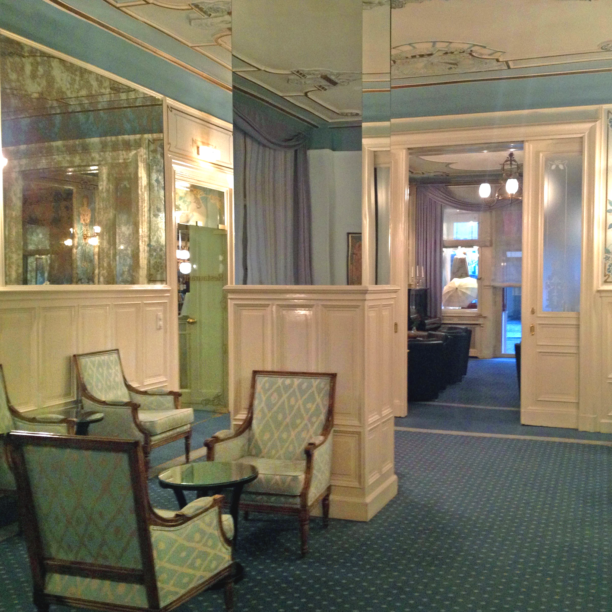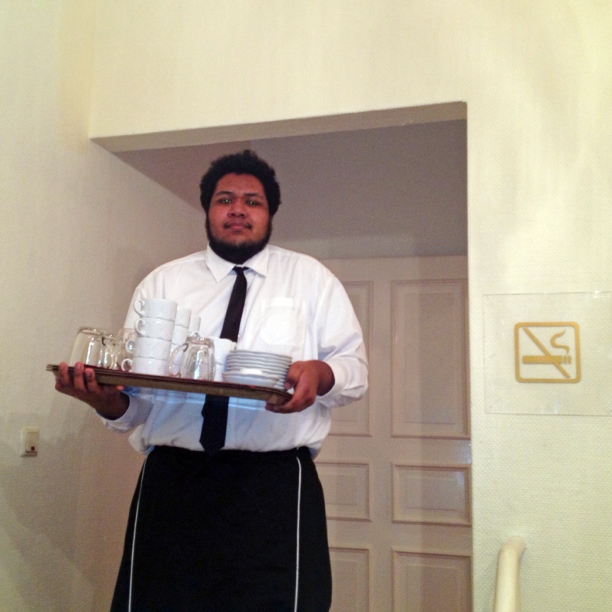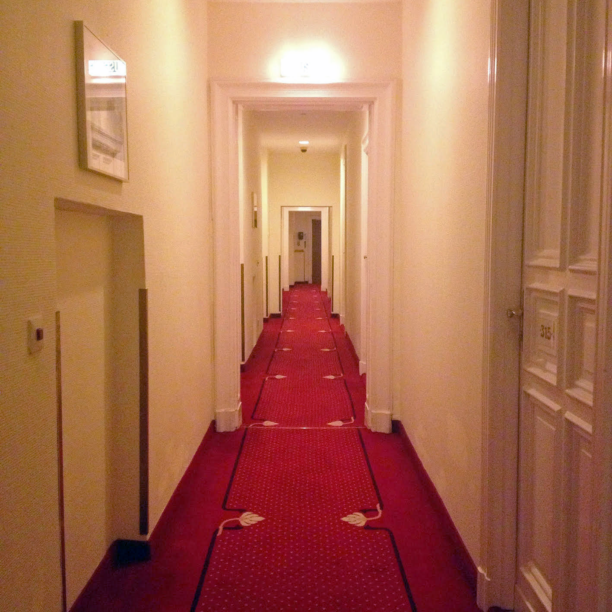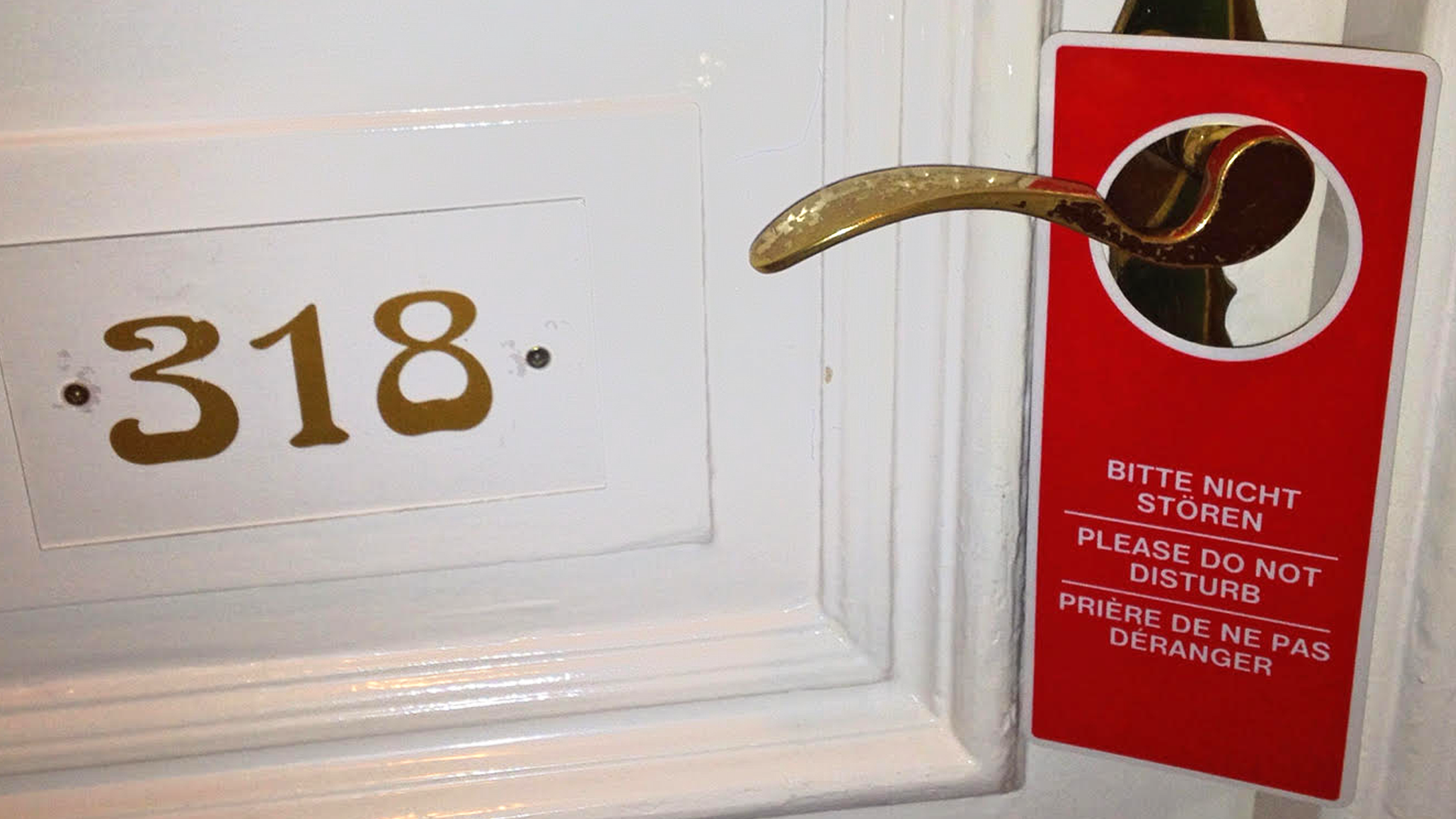Translated from Hebrew by Josh Friedlander
Like any great invention, I stumbled upon the idea of the hotel-room vacation by accident, nine years ago, after Toony and I arrived in Chania, Crete, for our honeymoon. The “magical Venetian town” I’d read of in a British travel magazine turned out to be a maze of souvenir shops, Irish pubs, and “authentic” Greek tavernas, so described on the doors and menus. Our hotel room, though, was amazing. It had old-world wood furniture, nice balconies with port views and fantastic natural air circulation that I’ve never experienced since. We read, watched TV, chatted, ordered sea-food pizza, I wrote a little, Toony doodled a bit; as the honeymoon came to an end, we realized we hadn’t set foot outside the premises. It was the best vacation ever. The next year we did the same thing in Eilat.

Photo: Markus Schweizer (CC BY-SA 4.0) via Wikimedia Commons
I find the spatial layout of a hotel room to be well suited to working, especially to writing. The desk is usually set in a corner, and very small, almost risibly so, as if to hint that work done seated, at a table, is a dumb idea. The bed is the room’s dominant feature. It occupies the centre, and allows different workspaces by configuring the pillows (throw and regular). The nightstands on either side double as storage and work spaces. No wonder that Vladimir Nabokov completed Pale Fire, my favorite book, while living in a suite at the Montreux Palace hotel.
True, working lying down brings its own challenges: it’s hard to avoid dozing off every few minutes. My solution is constant snacking, the fear of choking acting as a stimulant.
The places I find ideal to encamp at are the luxury hotels of yesteryear, built around the end of the 19th century for train travelers, shabby and dated, thinly staffed and clinging on mainly through inertia. They are easy to find, just search TripAdvisor reviews with the words “needs urgent renovation!” Another sure sign of a Once-Grand Old Hotel is that the bathroom is larger than the main room. This architectural choice encourages repeated baths, which also help in the battle to stay awake.

I am writing this during a hotel-room-vacation in Berlin, a great destination for not exploring. It is my fourth time here since Toony started working with a local gallery. I find this city too full of nature and open spaces, too vast for a long city walk, and way too dark at night. In Tel Aviv, my hometown, the streets at night are lit up like a football stadium. The hotel in Charlottenburg, on the other hand, is just my type: black and while marble floor at the entrance, a wooden bar, candlesticks and chandeliers everywhere, Hellenic full-head sculptures in the lobby and, of course, a claustrophobic elevator complete with 70-year-old elevator operator.
In my first two days of seclusion in the hotel, I lived on room-service salad and tomato soup and focused on finishing a long-delayed article while Toony worked at the gallery. My confinement caused me to enjoy Berlin for the first time: not going out into it, I couldn’t be disappointed, frustrated or cheated. From the hotel room, the city seemed so full of potential for adventure. Through the window, everything looked so interesting!
One of the greatest pleasures of spending a whole day in a climate-controlled hotel bed is the delicate feeling of simultaneous alienation and intimacy, asceticism and bourgeois comfort. You are lying in the middle of a strange city, the language droning on the TV is not yours. Your room is a temporary lodging space with its generic hotel carpets, reading lamps and mini-bar. But during your short period of full occupancy and no cleaning service, it’s all yours; the room is very small, almost body-sized, so you get used to each other quickly, your stuff spread all over the floor.

The main problem affecting a hotel casanier is the repeated interruptions of hotel staff, who are in an apparent frenzy to organise the room and erase any budding traces of personal history. The knocks start gently, around ten, and increase in aggression after noon. The first two days I ignored the pounding, but on the third, the attendant—an Indian guy named Zahir—tried a new tactic, and phoned to ask if I was expecting to leave the room eventually. I knew that sooner or later I’d need to get to a supermarket to replace the overpriced minibar snacks I’d been devouring, so we agreed on forty minutes later, my place.
My brief daily trip to the supermarket on Kantstraße became a miniature sightseeing route through the neighbourhood. Freed of the tourist’s duty to rush around the city and not miss anything, I was able to go deep on one segment of a single street, creating my own routine of small habits. In a bookstore on Savignyplatz I found out that Walter Benjamin was a resident of the neighbourhood, and bought an English translation of his memoir, “Berlin Childhood around 1900”—a collection of very short essays about meaningful objects and places of his Berlin upper class-Jewish childhood, which Benjamin wrote as a goodbye letter to his hometown, right before leaving Berlin in the 30s. I made friends with a bonsai store owner and with his rival, the owner of a different bonsai store; I bought $85 socks at a wonderful colourful-sock store, and traded the room service tomato soup for breakfast at a deli owned by two brothers from Nabatieh, Lebanon.
Zahir and I learned to time our meetings so that he finished his work just as I was returning to refresh the supply. He clearly noticed me swapping the minibar snacks but kept his silence. We had spoken a few courtesy words.
Reading Benjamin’s memories back in the room, I couldn’t help noticing that most of his fragments were set around his childhood room. Isn’t one of the strongest pleasures of hotel-room fortification is how it allows you, as a grown-up, this rare, forgotten feeling of knowing that someone else, someone responsible, is taking care of life for you?—making sure things are functioning smoothly and safely?—a hotel, I realized, is perhaps the closest you can get to being a child again, locking yourself up in your room.
At Toony’s exhibition opening at the gallery, my only significant sortie from the hotel street, I spoke to Rotem, an Israeli curator who specialises in Indian art. I have told her about Zahir, and asked her advice for a topic for small talk with him. “Cricket, of course,” she said, “it’s the World Cup semifinals. India against New Zealand. You should ask him about that.” The next morning, I asked Zahir about the game. In the next few days, he replied, there would be renovations in the morning. I might want to move to the lobby.

The small, gilded bar in the lobby only opened at 5:00 pm, when the hotel guests started to stream back from all over the city. At Zahir’s advice I settled down there over the next few days from 11AM. Kathleen, the bartender and office lady, let me pour my own drinks. She asked what kind of writing I do. I didn’t want to tell her I was actually writing about us, right now, talking in the lobby, so I told her that I was my colleague Nir Baram, an Israeli author who sells pretty well in Germany. Maybe she’d heard about my latest book, World Shadow? When she asked what I was working on now, I sent Nir a Twitter DM asking what his next book was about. It was a memoir about my childhood in Jerusalem, apparently.
Toward evening, as Zahir and Kathleen finished their shifts, Toony arrived back from the Gallery. “I’ve had a hard day,” she said, back in our room. She was flipping channels with the TV remote while I ordered room service.
“So,” she asked, “what did I miss?”







